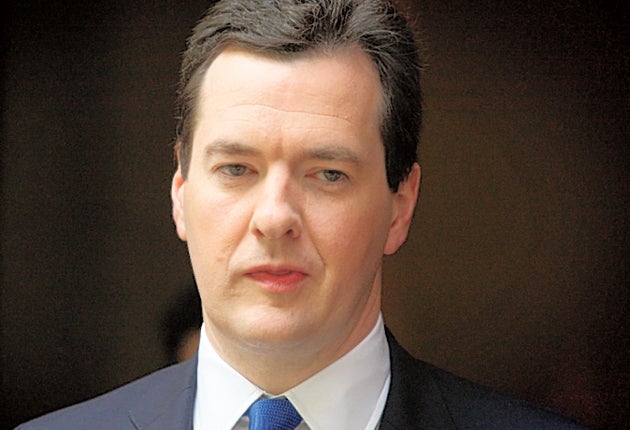Osborne eyes incapacity claimants for savings

Your support helps us to tell the story
From reproductive rights to climate change to Big Tech, The Independent is on the ground when the story is developing. Whether it's investigating the financials of Elon Musk's pro-Trump PAC or producing our latest documentary, 'The A Word', which shines a light on the American women fighting for reproductive rights, we know how important it is to parse out the facts from the messaging.
At such a critical moment in US history, we need reporters on the ground. Your donation allows us to keep sending journalists to speak to both sides of the story.
The Independent is trusted by Americans across the entire political spectrum. And unlike many other quality news outlets, we choose not to lock Americans out of our reporting and analysis with paywalls. We believe quality journalism should be available to everyone, paid for by those who can afford it.
Your support makes all the difference.A controversial drive to reduce the £12.5bn a year paid to sick and disabled people deemed unfit to work will be at the heart of the government-wide spending review this summer.
George Osborne, the Chancellor, disclosed yesterday that incapacity benefit would be targeted as the Government steps up its search for deep spending cuts to tackle the £150bn deficit in the public finances.
Ministers believe that many of the 2.6 million claimants are capable of some work, and many would want to work part-time if given more advice and support. They may speed up fit-to-work tests for existing recipients, a move officials believe could result in one million people being taken off incapacity benefit. Those who do not take up part or full-time work would be transferred to jobseeker's allowance, which is less generous – about £20 a week for many recipients.
Claims for incapacity benefit were allowed to soar by the Thatcher government as a way of massaging down the politically sensitive unemployment figures, and it has been a Treasury target ever since.
Although a succession of Tory and Labour ministers have tightened medical assessments for new claimants, they have shied away from taking the benefit away from those already on it. The coalition Government is preparing to cross that line.
Ministers say they can withstand the kind of pressure put on the Blair government in 1997 when disabled people chained themselves to the gates of Downing Street. Speaking to journalists on the margins of the G20 summit in Canada, Mr Osborne said that reducing the welfare budget could spare some other departments the 25 per cent average cuts he announced in last week's Budget. "This is a real trade-off," he said. "It's not a choice that can be ducked."
Winter fuel payments, free bus travel and television licences for pensioners are expected to survive because David Cameron, under pressure from Labour, made a pre-election pledge to keep them.
Mr Osborne said: "We have given specific commitments on some, we haven't given specific commitments on others, and that's what I want to be part of the spending review over the summer. Some of these benefits individually are very much larger than [the budgets of] most government departments. Housing benefit is one of the largest. In its own right, it would be treated as one of the largest government departments."
He added: "Incapacity benefit and employment and support allowance [its successor] is a very large budget. Yes, we have got to look at all these things, make sure we do it in a way that protects those with genuine needs, those with disabilities, protects those who can't work, but also encourages those who can work into work."
A new cabinet committee on public spending will meet for the first time this week as the Chancellor begins the hard task of finding the headline cuts announced in his Budget by October. This so-called "star chamber" will force departmental ministers to justify their budgets. The only areas protected from cuts are health and international development.
Mr Osborne rejected calls from some senior Tories yesterday to end the special protection given to the health budget – another pre-election pledge by Mr Cameron; he cited the extra demographic pressures on the NHS. Lord (Nigel) Lawson of Blaby, the former chancellor, said yesterday that the Tories had been "afraid that if they didn't make this statement about the health service then they would be attacked... It's understandable to see why they said it, but I think it won't work."
Nadine Dorries, a Tory member of the Commons Health Select Committee, told the BBC's Politics Show: "I think we need to find the political courage to accept that there is excessive waste in the NHS, and that it's unfair to expect the other departments to take all the hits."
Join our commenting forum
Join thought-provoking conversations, follow other Independent readers and see their replies
Comments